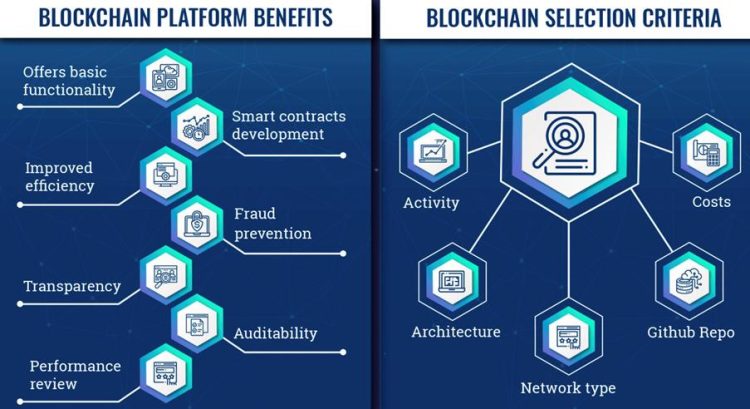In the epic battle of the blockchain titans, Ethereum and Hyperledger step into the ring to duke it out for the title of ultimate business solution. These two platforms may seem like your average pair of digital contenders, but don’t be fooled – their unique features and capabilities are sure to make for an electrifying showdown. So grab your popcorn, settle in, and let’s see which blockchain heavyweight will reign supreme in the world of business innovation.
Key Differences between Ethereum and Hyperledger
When it comes to Ethereum and Hyperledger, the two blockchain platforms have some key differences that set them apart. Let’s take a closer look at what makes each of them unique:
- Consensus Mechanism: Ethereum uses the proof-of-work consensus mechanism, while Hyperledger uses a different consensus algorithm called Practical Byzantine Fault Tolerance. In other words, Ethereum relies on miners racing to solve complex mathematical puzzles to validate transactions, while Hyperledger takes a more organized approach to achieve consensus among its network participants.
- Public vs. Private: Ethereum is a public blockchain platform, meaning anyone can participate in the network and access its data. On the other hand, Hyperledger is designed for private and permissioned networks, where only selected participants have access to the blockchain and its information. It’s like the difference between throwing a wild party and hosting a fancy dinner.
- Smart Contracts: While both Ethereum and Hyperledger support smart contracts, they have different ways of executing them. Ethereum uses its own programming language called Solidity, making it more flexible but potentially prone to bugs. Hyperledger, on the other hand, supports multiple programming languages like Java and Go, offering a more stable environment for smart contracts.
Overall, Ethereum and Hyperledger may seem like distant cousins in the blockchain world, but they each have their own strengths and weaknesses. Whether you prefer the wild west of Ethereum or the exclusive club of Hyperledger, there’s no denying that both platforms are making waves in the cryptocurrency space. So, which one will you choose for your next blockchain adventure?

Consensus Mechanisms Utilized by Ethereum and Hyperledger
Ethereum and Hyperledger utilize different consensus mechanisms to validate transactions and maintain the integrity of their networks.
**Proof of Work (PoW):** Ethereum relies on PoW to validate transactions through mining. Miners solve complex mathematical puzzles to validate transactions and secure the network. This mechanism is energy-intensive and often criticized for its environmental impact.
**Proof of Stake (PoS):** On the other hand, Hyperledger uses a PoS consensus mechanism. Participants in the network are chosen to validate blocks based on the number of coins they hold. This mechanism is more energy-efficient compared to PoW but still ensures network security.
**Byzantine Fault Tolerance (BFT):** Hyperledger also employs a BFT consensus mechanism, where nodes in the network agree on the validity of transactions. This mechanism is resilient to malicious attacks and ensures network consensus even in the presence of faulty nodes.

Smart Contract Functionality in Ethereum and Hyperledger
Have you ever wondered how smart contracts actually work in platforms like Ethereum and Hyperledger? Well, let me break it down for you in a way that even your grandma could understand (well, maybe not Grandma Ethel, but you get the idea).
So basically, smart contracts are like those super organized people who always follow through on their promises. They are self-executing contracts with the terms of the agreement directly written into code. No flaking out or forgetting to pay up – these babies automatically execute when the conditions are met.
Think of it like this – if Ethereum and Hyperledger were high school cafeterias, smart contracts would be the lunch ladies making sure you get exactly what you ordered. There’s no sneaky substitutions or second guesses – just pure, efficient execution.
And the best part? Smart contracts can handle all sorts of transactions, from transferring assets to enforcing the rules of a game. They’re like a Swiss Army knife of the blockchain world – versatile, reliable, and always ready to get the job done.

Scalability and Performance Comparison
When it comes to scalability and performance, it’s like comparing a tortoise to a cheetah. Sure, they both move, but one is definitely faster and can handle a larger workload.
In the world of technology, scalability is like having a magical spell that allows your software to effortlessly handle an increase in users or data. It’s like having an endless bag of holding that never gets full. On the other hand, performance is like a finely tuned, turbocharged engine that keeps your software running smoothly and efficiently. It’s like having a sports car that can go from 0 to 60 in the blink of an eye.
So, how do you know if your software has what it takes to be the cheetah of the tech world? Well, you can run some scalability and performance tests to see how it stacks up. Here are a few key factors to consider:
– **Load Testing**: This is like inviting all your friends over for a party and seeing if your software can handle the crowd without crashing.
– **Response Time**: How quickly does your software respond to user actions? Is it like a lightning bolt or more like a snail on a leisurely stroll?
– **Resource Usage**: Is your software a resource hog, gobbling up CPU and memory like it’s an all-you-can-eat buffet? Or is it more like a frugal shopper, using only what it needs?
In the end, scalability and performance are key factors in determining the success of your software. So, make sure your tortoise is on its way to becoming a cheetah!
Privacy and Permissioning Features of Ethereum and Hyperledger
Both Ethereum and Hyperledger are equipped with some impressive privacy and permissioning features. **Ethereum** gives users the ability to create private chains within the network, keeping their transactions hidden from prying eyes. With Hyperledger, users can set up permissioned networks, controlling who has access to what information within the system. It’s like being the bouncer at the club of blockchain - only VIPs allowed!
In terms of privacy, **Ethereum** offers zk-SNARKs which allow for transactions to be verified without revealing any information about the parties involved. Hyperledger, on the other hand, boasts advanced encryption techniques that keep sensitive data secure from unwanted snoops. It’s like having a high-tech security guard protecting your digital assets at all times – talk about peace of mind!
When it comes to permissioning, both **Ethereum** and Hyperledger allow for role-based access control, ensuring that only authorized users are able to interact with certain parts of the network. So, just like in a top-secret spy organization, you need the right credentials to access the classified information. So, go ahead and dive into the world of blockchain with the confidence that your privacy and security are in good hands with Ethereum and Hyperledger!
Use Cases and Industries Best Suited for Ethereum and Hyperledger Integration
Both Ethereum and Hyperledger have their own strengths and weaknesses when it comes to integration with different industries. Let’s take a look at some of the top use cases and industries that are best suited for leveraging the combined power of these two blockchain platforms:
Supply Chain Management: Ethereum’s smart contract capabilities combined with Hyperledger’s permissioned network can revolutionize supply chain transparency and efficiency. Industries such as manufacturing, food and beverage, and logistics can greatly benefit from the seamless integration of these technologies.
Healthcare: With Ethereum’s ability to securely store and share sensitive medical data and Hyperledger’s focus on privacy and compliance, the healthcare industry is a perfect fit for blockchain integration. Imagine a world where patient records are securely stored and easily accessible across healthcare providers.
Finance and Banking: The financial sector can take advantage of Ethereum’s tokenization capabilities and Hyperledger’s built-in governance features for creating secure and efficient financial products. From cross-border payments to smart contracts for lending, the possibilities are endless for integrating these technologies into the finance industry.
FAQs
Can you explain the main differences between Ethereum and Hyperledger?
Sure! Imagine Ethereum as the flashy, unpredictable friend who loves to party and innovate in the blockchain space, while Hyperledger is the reliable, business-oriented buddy who prefers stability and predictability.
Which platform is better suited for businesses looking to implement blockchain technology?
It really depends on the specific needs of the business. If you’re looking for flexibility and want to explore smart contracts and decentralized applications, then Ethereum might be your go-to. On the other hand, if you value security, scalability, and permissioned networks, Hyperledger could be the perfect match.
How do Ethereum and Hyperledger differ in terms of consensus mechanisms?
Ethereum uses the proof-of-work consensus mechanism (aka mining), which can be slow and energy-intensive, while Hyperledger offers various consensus algorithms like Practical Byzantine Fault Tolerance (PBFT) and Raft, which are more suited for enterprise applications where efficiency and speed are key.
Which platform is more cost-effective for businesses to use?
Hyperledger tends to be more cost-effective for businesses due to its permissioned network model, which means lower transaction fees and less energy consumption compared to Ethereum’s public, proof-of-work network.
Can businesses integrate existing systems with Ethereum or Hyperledger easily?
Both Ethereum and Hyperledger offer tools and libraries to help businesses integrate blockchain technology with their existing systems. However, Hyperledger’s modular architecture makes it more customizable and adaptable to different business needs compared to Ethereum’s more rigid structure.
Which platform has a larger community of developers and support?
Ethereum boasts a large and active community of developers and supporters, thanks to its open-source nature and popularity in the cryptocurrency space. On the other hand, Hyperledger also has a growing community of developers and contributors, especially among enterprises and industries looking for robust blockchain solutions.
Conclusion:
In conclusion, both Ethereum and Hyperledger offer unique strengths and capabilities that can benefit businesses looking to implement blockchain technology. Whether you prefer the innovation and flexibility of Ethereum or the reliability and scalability of Hyperledger, it’s essential to carefully consider your specific business needs before choosing a platform. Happy blockchain exploring!






